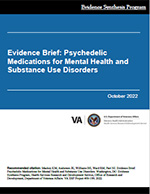
Recommended Citation:
Mackey KM, Anderson JK, Williams BE, Ward RM, Parr NJ. Evidence Brief: Psychedelic Medications for Mental Health and Substance Use Disorders. Washington, DC: Evidence Synthesis Program, Health Services Research and Development Service, Office of Research and Development, Department of Veterans Affairs. VA ESP Project #09-199; 2022.
Download PDF: Brief, Supplemental Materials
Results from small RCTs demonstrate that MDMA-assisted psychotherapy for PTSD may improve symptoms and lead to remission for some individuals in the short-term. Psilocybin-assisted psychotherapy for depression also shows some promise. Study interventions included intensive psychotherapy protocols that may be challenging to implement in everyday practice. Results may not be generalizable to diverse populations and settings. Evidence is therefore very preliminary and several critical gaps need to be addressed by future research.
Psychedelics have been proposed as novel treatments of adults with mental health and substance use disorders based on the supposition that intentional use of psychedelics over a limited period can disrupt problematic thought patterns, facilitate psychotherapy, and potentially lead to behavior change. The aim of this review is to inform VHA program planning by synthesizing available evidence on the benefits and harms of psychedelics as treatment for mental health and substance use disorders.
Among 2,532 potentially relevant articles, we included 38 studies. MDMA-assisted psychotherapy for PTSD has been the most extensively studied, and MDMA paired with intensive psychotherapy may reduce PTSD symptom severity (pooled difference in PTSD symptom change: -0.91, 95% CI [-1.33, -0.50]). Psilocybin-assisted psychotherapy may reduce symptom severity. Ayahuasca use for depression may also be associated with a reduction in short-term symptoms and suicidality. No serious adverse events were reported for MDMA, psilocybin, or ayahuasca. Ibogaine did not improve opioid withdrawal symptoms in 1 small RCT despite observational data showing benefits and has been associated with serious adverse events. Psychedelic treatments are still in an early phase of development and critical evidence gaps include whether treatment effects vary by patient characteristics and disease severity and whether benefits are durable over time. The feasibility of implementing intensive psychotherapy protocols in real-world settings is also unclear.